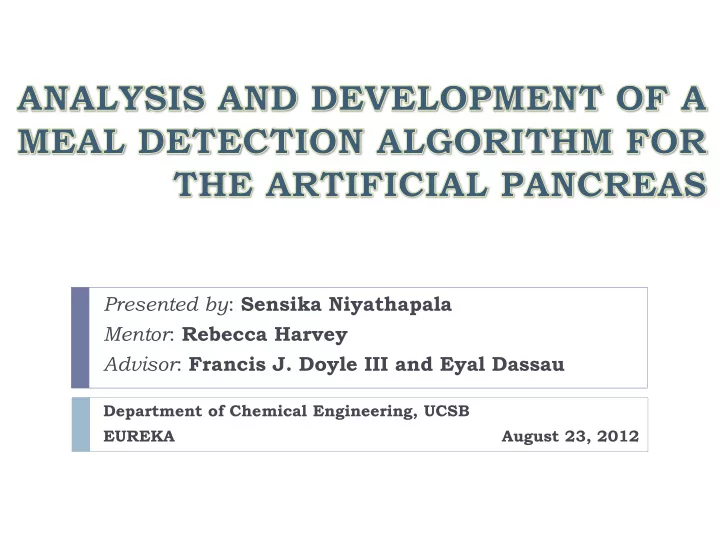

Presented by : Sensika Niyathapala Mentor : Rebecca Harvey Advisor : Francis J. Doyle III and Eyal Dassau Department of Chemical Engineering, UCSB EUREKA August 23, 2012
Type 1 Diabetes Cause and Effects of Type 1 Autoimmune destruction of pancreatic beta cells No control of blood glucose Exogenous insulin required http://www.cumc.columbia.edu/news-room/wp- content/uploads/2012/04/image001.jpg Current disease therapy Self monitoring Multiple daily insulin injections http://www.southboromedical.com/images/fingerstick.jpg 2
Future of Disease Therapy: Artificial Pancreas 3
Effect of a Meal on Glucose 4
Project Goals Implementing basic meal detection algorithm Establish metrics that represent desired qualities Alarms faster than current controller response Very few false alarms True positive alarms 5
Data from Clinical Trials (12 subjects) Breakfast and dinner given with NO meal announcement 6
Algorithm and System Alarming Start of Insulin Response Slope predicted at each point Algorithm Parameters Threshold Subsequent Alarms Required (SAR) Max and min slope 7
Hypotheses Hypothesis 1 : with SAR 1, the reaction time for detecting a meal will be the fastest, however there will be more false positive alarms Hypothesis 2 : by using SAR 3, we anticipate a longer reaction time with a greater number of false negative alarms, but less false positive alarms present 8
Determining the Best Parameter Settings: SAR 100 Faster Response 90 80 From meal To alarm 1 From meal To alarm 2 70 From meal to alarm 3 60 Time From Undetected Meals Meal To Alarm 50 (min) 40 30 20 10 0 1 2 3 4 5 6 7 8 9 10 11 12 13 14 15 16 17 18 19 20 21 22 23 24 Meal Number 9
Results: The Better Detector Number of Alarms Required 1 2 3 True Positive Ratio 21/24 21/24 19/24 # of False Positives 1/24 1/24 1/24 Average Time Difference from Alarm to -11 ± 1 min -6 ±17 min 3 ± 14 min Insulin Delivery 10
Conclusions & Future Work Hypothesis 1 unconfirmed: SAR 1 should have had more false positive alarms Hypothesis 2 confirmed: SAR 3 had more false negative alarms Future Work: Using the basic algorithm as a benchmark for an advanced system 11
Acknowledgements 12
Questions? 13
Recommend
More recommend